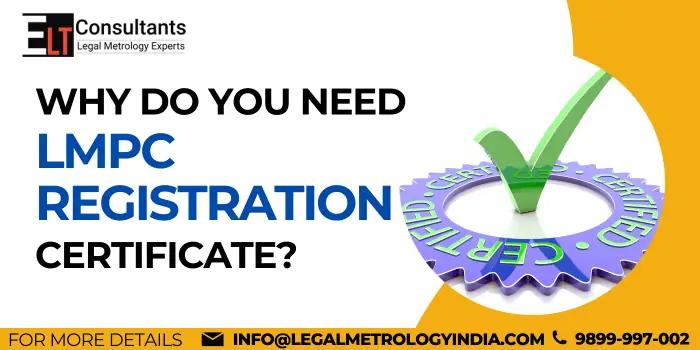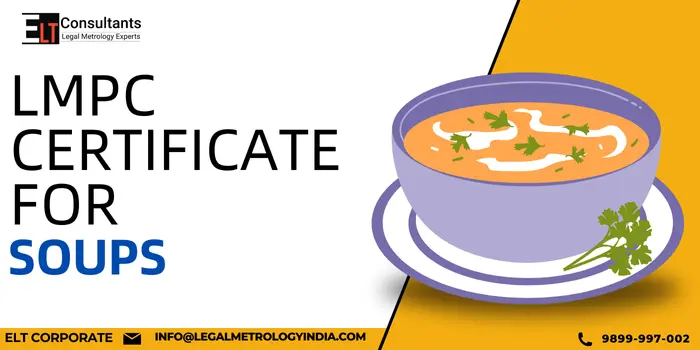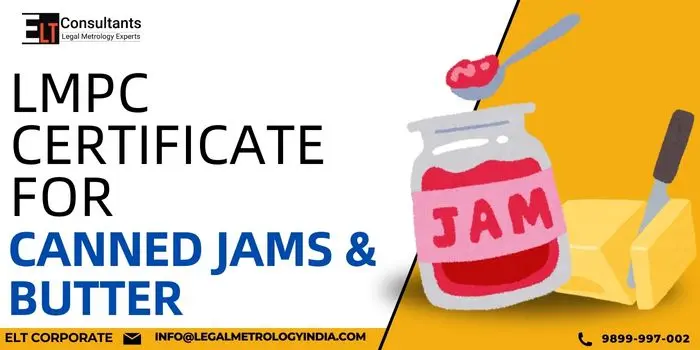Are you the one who is willing to regulate pre-packaged commodities from one place to another without any issues? Then, here comes the solution for you. You need an LMPC registration certificate to handle entities freely from one place to another.
The LMPC certificate is an essential legal document for manufacturers, importers, or packers of pre-packaged commodities in India. The LMPC Registration Certificate is also known as the Importer’s License.
According to the Legal Metrology Act 2009 (Section 19), the LMPC law was strictly followed by the customs officials. It shows that the products are manufactured according to the Indian standards. The Department of Legal Metrology enforces this certificate under the Ministry of Consumer Affairs, Food, and Public Distribution.
Overview Of LMPC Registration Certificate
LMPC stands for Legal Metrology Packaged Commodity. According to Rule 27 of Legal Metrology (Packaged Commodity Rules, 2011), legislated by the Department of Consumer Affairs, this certificate is mandatory for importers to import pre-packaged goods.
What Is the LMPC Registration Certificate?
Legal Metrology Packaged Commodity certificate is a crucial document for importers in India seeking to import pre-packaged goods easily. It adheres to Rule 27 under the LMPC rules set forth by the Department of Consumer Affairs.
To initiate the import process for any packaged commodities, submitting the LMPC certificate online at least 90 days before commencement is mandatory.
The Legal Metrology Act 2009 outlines various rules, regulations, and laws that must be observed for LMPC certification. Additionally, several states have modified their LMPC rulebooks to align with specific state requirements and objectives.
Why Is LMPC Registration Required?
LMPC registration is necessary to make sure that pre-packaged goods meet legal standards. It helps ensure that labels, packaging, and selling practices are accurate, promoting fairness for businesses and protecting consumers.
How Do Importers And Manufacturers Obtain LMPC Licenses For Selling Pre-Packaged Goods In India?
So, Before importing pre-packaged goods for sale or manufacturing in the country, you must obtain an LMPC importer license under Rule 27 of the Legal Metrology Pre-Packaged Commodity Rules, 2011.
Suppose you are an importer or manufacturer selling pre-packaged commodities in any state. In that case, you should apply to the Controller of Legal Metrology in that particular state, as per the Department of Consumer Affairs.
Importers who sell in more than one state must register with the Director of Central Government. The same rule applies to local manufacturers selling their products in multiple states.
What Documents Are Required For an LMPC Certificate?
Documents required for the LMPC registration certificate are mentioned below:-
- Import Export Code
- MOA-AOA/Partnership Deed.
- Directors/Partners/ Proprietors KYC.
- Name of Products for which you want a license.
- Photo of the label where MRP/import/Manufacturing/Qty other declarations are made.
- GST Certificate
- Address of all Warehouses.
- Email ID of Customer care and Customer care contact number.
- Class – 3 Organization’s Digital signature certificate required
- LMPC manufacturer/packer
Note: IEC Codes are only required by importers.
Different Categories Of LMPC Certificates
The LMPC certificate is classified into two distinct categories, each with its license.
For Non-Weight and Measuring Instruments
Non-weight and Measuring Instruments come in two different categories:-
- Manufacturer Registration or Packer – As per the Legal Metrology Law, the Manufacturer registration or packer is a single individual who sells pre-packaged goods in the market.
- LMPC Certificate Registration or Importer – Those engaged in importing or exporting pre-packaged commodities must adhere to Rule 27 of the Legal Metrology Packaged Commodities Rules, 2011.
For Weight and Measurement Instruments
Weight and Measurement Instruments come in two distinct categories:-
- Manufacturing Permit – Before manufacturing any goods or items, individuals, firms, Hindu Undivided Family Businesses, companies, corporations, societies, and others must obtain government approval under Legal Metrology Rule 27, 2011.
- Model Approval – Section 22 of Indian Legal Metrology mandates securing approval for the model of Indian weight and measurement instruments.
Who Required an LMPC Certificate?
Businesses involved in importing, manufacturing, exporting, selling, & packing of pre-packaged goods must have an LMPC certificate, also called an importer’s license.
Manufacturers:
- Manufacturers of pre-packaged commodities intended for sale in India must obtain an LMPC certificate.
- The certificate ensures compliance with the Legal Metrology Pre-Packaged Commodity Rules, 2011.
Importers:
- Importers of pre-packaged goods in India must also obtain an LMPC certificate.
- This certificate is necessary before importing and selling pre-packaged commodities in the country.
What Are The Exemptions For an LMPC Certificate?
Below, we have mentioned the exemptions of the LMPC registration certificate for the companies importing pre-packaged goods in India.
- If the packaged good’s net weight is less than 10 grams or 10 millilitres
- Cooked fast foods that are packed in a restaurant or hotel.
- Chemicals that fall under drugs order,1995
- Agricultural production packages that weigh more than 50kg
Legal Metrology Act, 2009 is exempted for –
- Packaging weighing more than 25kg or 25 litres, with the exemption of fertilizers and cement packages that are sold in packages of 50kg
- Packages of institutional consumer
What Are The Types Of LMPC Certificates?
The types of LMPC certificates are mentioned below:-
- LMPC Importer License: Required for importing pre-packaged goods for sale or distribution within the country under Rule 27 of the Legal Metrology Packaged Commodity Rules.
- LMPC Manufacturer & Packer License: Necessary for manufacturers producing pre-packaged commodities for sale or distribution domestically.
These certificates ensure compliance with legal metrology regulations and facilitate the sale of standardized packaged commodities.
What Are An Importer’s Responsibilities?
Knowing their duties under the law is essential to understand why LMPC is crucial for importers. Importers have legal obligations which include:-
- Availability of product generic name
- Provide details of the product manufacturer.
- Mention the exact product quantity.
- Specify the exact retail price as mandated by law.
- Correct product price – maximum retail price
- Maintain all details – name and address of the importer.
- Mention details like dimensions or capacity.
- Specify the exact manufacturing date, including the day, month, and year.
How To Track LMPC Certificate Online?
Follow these 8 easy steps to track your LMPC registration certificate online:-
- Directly visit to state government website (Legal Metrology India)
- At the top of the page, locate the Tracking button to access.
- You will be redirected to the tracking page.
- Add details like the department’s information.
- Enter the acknowledgement number provided during the second step.
- Complete the verification by solving reCAPTCHA.
- Now click on the submit button.
- You will receive the application along with the tracking report.
What Are The Items Covered Under the LMPC Certificate?
The LMPC certificate covers various items, including pre-packaged commodities, weighing and measuring instruments, and packaging materials regulated under the Legal Metrology Packaged Commodity Rules. Check out a detailed list of items covered under the LMPC certificate.
Fines & Violation Of LMPC Certificate
If you are not following the law and violating the rules, then you have to pay for it, so follow the mentioned LMPC rules:-
- Breaking regulation rules 27-31 will incur a punishment of Rs. 4000.
- A fine of Rs. 2,000 applies to any additional regulation not specified in the LMPC certificate.
- An importer will receive a fine of Rs. 5000 if they apply for an LMPC certificate online and submit it more than 90 days from the import date.
Connect with us to understand further penalties. We will provide you with all the details related to penalties and fines of LMPC certificates.
How To Get An LMPC Certificate Online In India?
The online application process for obtaining a legal metrology certificate is accessible in selected states. Therefore, verifying the availability of electronic submissions within your jurisdiction is imperative. Also, Please note that the process may vary from one state to another.
Here’s the procedure to obtain an LMPC Certificate online in India:
- Fill Application – To simplify this task, contact ELT corporate, and we will help you with the essential information. Following that, we will handle the online application for the LMPC certificate on your behalf without any complications.
- Documentation – Based on the application, our team will assemble the necessary paperwork, gather all the required documents, and submit them along with the application form to the relevant department.
- Verification by government department – After our expert team offers all the necessary documents, applications, and payments to the department, they will check and verify all the papers and application forms.
- Get the LMPC Certificate Online – After approving the application and receiving the importer’s declaration, the Legal Metrology Department issues the LMPC certificate. The importer can then present this certificate to the customs authorities when clearing imported goods at the port.
How Can ELT Corporate Assist You?
ELT Corporate is one of the best platforms to assist with your legal metrology certificate consultant requirements and connect you with consistent professionals.
Clients who seek assistance from ELT are satisfied with our legal services. Thanks to our commitment to simplifying the legal procedure. We consistently provide systematic briefings and receive positive responses.
If clients are seeking assistance, ELT representatives are readily available by phone. ELT ensures seamless and positive communication with legal professionals.
Conclusion
In conclusion, obtaining an LMPC registration certificate is imperative to ensure compliance with legal requirements governing the importation and distribution of pre-packaged goods in India under the Legal Metrology Act 2009 and the associated Packaged Commodity Rules.
This certification signifies adherence to standardized measurements, accurate labelling, and consumer protection protocols. By securing an LMPC certificate, businesses demonstrate their commitment to regulatory compliance, consumer welfare, and fair trade practices.
FAQ
Is The LMPC Certificate Mandatory?
Yes, according to Rule 27 of the legal metrology packaged commodity rules enacted by the Department of Consumer Affairs.
What Is The Full Form Of LMPC?
The LMPC stands for “Legal Metrology Packaged commodity“.
What Is The Purpose Of the LMPC Registration Certificate?
The purpose of LMPC registration certificate ensure that the pre-packaged commodities in India comply with the Legal Metrology (Packaged Commodities) Rules, 2011. These rules were framed to enforce the LM Act of 2009.
What Is The LMPC Import License Certification Validity?
The LMPC import license certification is valid for a minimum of one year & maximum of 5 years.
What Are The Eligibility Criteria for LMPC Registration Certificate
Importers must comply with the Rules of Legal Metrology Packaged Commodities (LMPC), released in 2011, before importing any goods.
Who Qualifies As A Packer?
Any individual or firm who pre-packs any commodity, whether in a bottle, tin, wrapper, or any other suitable unit for sale, is considered a packer. Packers must register with the Department of Legal Metrology.
Are There Additional Declarations For Specific Types Of Commodities?
Food products may require supplementary declaration, including ingredients, nutritional information, additives, and usage instructions.
Non-food items may require information such as country of origin, usage directions, safety warnings, and warranty details.



